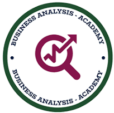Business Analyst Techniques in bangalore
In this comprehensive program, we delve deep into the core methodologies and skills vital for navigating the intricate world of business analysis
Business Analyst Techniques
Welcome to the realm of Business Analyst Techniques in bangalore at Business Analyst Academy in bangalore. In this comprehensive program, we delve deep into the core methodologies and skills vital for navigating the intricate world of business analysis. Let’s embark on a journey to uncover the essential techniques that empower business analysts to drive organizational success and innovation.Our faculty comprises seasoned industry professionals with years of experience in business analysis across diverse domains. They provide invaluable insights, guidance, and mentorship, ensuring that students gain practical knowledge and industry-relevant skills that directly translate to the workplace.

Business Analysit Technique:
Interviews:
Business analysts directly engage with stakeholders to extract valuable insights, clarify requirements, and gain a deeper understanding of their perspectives. By conducting structured or semi-structured interviews, analysts can explore specific topics in detail, gather relevant information, and identify stakeholders’ needs and expectations.Through active listening and probing questions, analysts can elicit key requirements and uncover underlying business challenges.
Workshops:
Workshops serve as dynamic forums where stakeholders from diverse backgrounds come together to collaborate, brainstorm ideas, and make decisions. Led by skilled facilitators, these sessions encourage active participation and foster creativity among participants. he allotted time frame. Through structured activities such as brainstorming sessions and group exercises, participants generate innovative solutions and explore different perspectives.
Document Analysis:
Document analysis involves a thorough examination of existing documentation, including business plans, reports, and requirements documents, to extract valuable insights and identify areas for improvement. Business analysts meticulously review these documents, paying close attention to details such as business objectives, processes, and stakeholder requirements. By analyzing the content, structure, and quality of existing documents, analysts can gain a comprehensive understanding of the current state of the business and identify any gaps or inconsistencies.
Observation:
Observation is a powerful technique used by business analyst techniques in bangalore to gain firsthand insights into stakeholder behaviors, workflows, and interactions within their natural environment. By immersing themselves in the work environment, analysts can observe how stakeholders perform their tasks, identify pain points, and uncover implicit requirements. ses.ation-gathering techniques, such as interviews and document analysis, to paint a holistic picture of the business landscape.
Prototyping:
Prototyping is a collaborative technique used by business analysts to visually demonstrate proposed solutions and gather feedback from stakeholders. By creating prototypes, analysts can bring concepts to life and provide stakeholders with tangible representations of the solution. Prototypes can range from simple sketches or wireframes to more detailed mockups or interactive prototypes, depending on the complexity of the solution. Stakeholder feedback is collected through prototype reviews and usability testing, allowing analysts to iterate and refine the solution based on user input.
Use Cases and
User Stories:
Use cases and user stories are narrative techniques used by business analysts to capture functional requirements from the user’s perspective. Use cases describe interactions between users and systems to accomplish specific goals or tasks, while user stories articulate user needs and expectations in a concise format. Both techniques focus on describing system behavior and functionality in a user-centric manner, enabling stakeholders to understand the requirements in context.
The Essential techniques
Requirements Elicitation Mastery:
- Understand the art of gathering requirements through interviews, workshops, and other elicitation techniques.
- Dive into strategies for effectively capturing stakeholder needs and translating them into actionable project requirements.
Stakeholder Analysis Strategies:
- Explore stakeholder identification, analysis, and engagement techniques to ensure alignment with project objectives.
- Learn how to manage stakeholder expectations and navigate diverse stakeholder interests for project success.
Mastering Business Process Modeling:
- Gain proficiency in visualizing and documenting business processes using industry-standard techniques like BPMN and flowcharts.
- Discover how process modeling aids in identifying inefficiencies and driving process improvement initiatives.
SWOT Analysis for Strategic Insights:
- Delve into SWOT analysis methodologies to evaluate organizational strengths, weaknesses, opportunities, and threats.
- Explore how SWOT analysis informs strategic planning, risk management, and competitive positioning.


Feasibility Study Fundamentals:
- Understand the process of conducting feasibility studies to assess the viability of proposed projects or solutions.
- Explore techniques for evaluating technical, financial, and operational feasibility factors.
Gap Analysis Techniques:
- Master gap analysis methodologies to identify discrepancies between current and desired states.
- Learn how gap analysis drives requirements prioritization and guides project planning efforts.
Root Cause Analysis Strategies:
- Explore root cause analysis techniques such as Fishbone diagrams and 5 Whys to identify underlying issues.
- Understand how root cause analysis informs problem-solving and process improvement initiatives.
Decision Analysis Frameworks:
- Learn decision analysis methods like Decision Trees and Cost-Benefit Analysis to evaluate alternative solutions.
- Explore decision-making models that aid in selecting the most viable course of action for project success.
Agile Techniques for Adaptability:
- Discover agile analysis techniques like user story writing and backlog grooming for iterative project delivery.
- Learn how agile methodologies enhance flexibility, collaboration, and responsiveness in project execution.
Join Today!
Join us at Business Analysis Academy in Bangalore, and unlock the secrets to mastering essential business analyst techniques. Gain the skills and knowledge needed to drive organizational success and excel in the dynamic field of business analysis. Your journey to becoming a proficient business analyst starts here.
CBAP Exam Domains:
Business analyst techniques are methods, tools, and approaches used by business analysts to gather requirements, analyze business needs, and facilitate solutions. These techniques help analysts effectively communicate with stakeholders, understand business processes, and drive organizational change.
Business analyst techniques are crucial for ensuring the success of projects and initiatives. By employing these techniques, analysts can elicit accurate requirements, identify stakeholder needs, and develop solutions that align with business goals. Effective use of techniques enhances communication, fosters collaboration, and improves decision-making throughout the project lifecycle.
The course covers a range of business analyst techniques, including interviews, workshops, document analysis, observation, surveys and questionnaires, prototyping, process modeling, use cases and user stories, and decision trees and decision tables. These techniques are essential for conducting thorough business analysis and delivering value-added solutions.
The course equips participants with practical skills and knowledge in business analyst techniques, enhancing their effectiveness and proficiency in their roles. By mastering these techniques, participants can contribute more effectively to project success, advance their careers in business analysis, and drive positive outcomes for their organizations.
While there are no specific prerequisites for enrolling in the course, participants should have a basic understanding of business concepts and processes. Previous experience in business analysis or related fields may be beneficial but is not mandatory.
The course caters to individuals at various levels of experience in business analysis. Whether you’re a beginner looking to enter the field or an experienced professional seeking to enhance your skills, the course offers valuable insights and practical techniques applicable to your career stage.
The course is structured as a series of interactive lectures, practical workshops, case studies, and hands-on exercises. Participants learn through a combination of theoretical knowledge and real-world applications, enabling them to immediately apply what they’ve learned in their professional roles.
Yes, the course provides opportunities for networking and collaboration with fellow participants through group activities, discussions, and project work. Participants can exchange ideas, share experiences, and build professional connections within the business analysis community.
“Enroll in our Business Analysis Academy in Bangalore today! Contact us to learn more about the program schedule, curriculum, and enrollment process. Take control of your future and become a recognized expert in business analysis with Techniques.”
Address:
#30, 3rd floor, RCR Arcade, Next to Regal Hospital, Sri Balaji Krupa Layout, Chokkanahalli, Bangalore – 560064
Phone
73384 98266
Email Us
kishore@businessanalysis-academy.com
